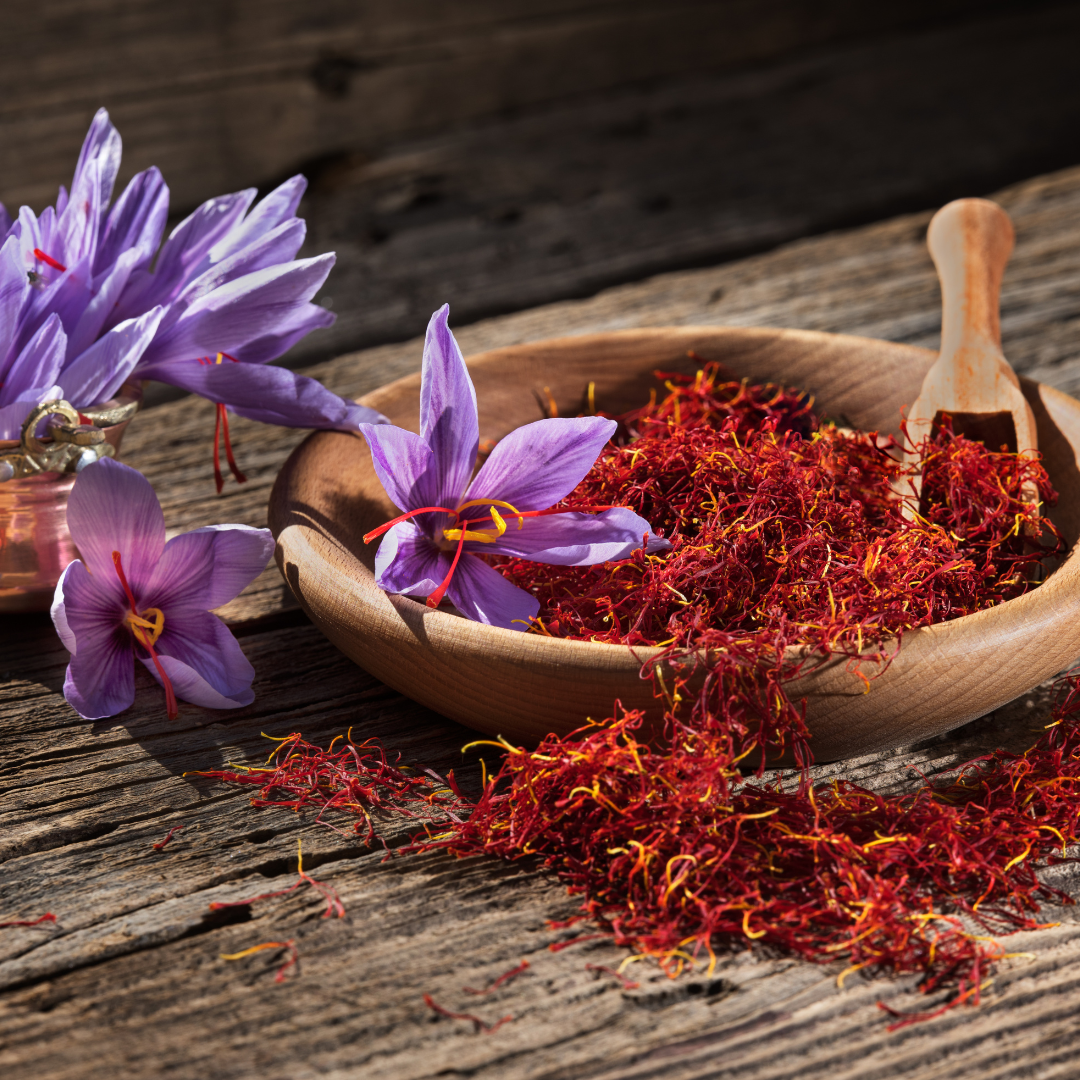Is Saffron Safe & Effective for Postpartum Depression? Here’s What the Research Says

Every year 15-20% of mothers experience postpartum depression (PPD) and that percentage rose up to 36% within the past few years due to COVID.1 And although antidepressant medications are an option for mothers who are experiencing PPD, studies have shown that many women- especially those who are pregnant or breastfeeding- wish to avoid medications due to unknown and/or unwanted side effects.2
When it comes to alternatives to antidepressant medications, natural remedies can be very helpful for some individuals. However, it’s important to find a solution that is backed by research. Fortunately, more research is looking into natural treatments for PPD and one of these promising treatments is saffron.
What is saffron?
Saffron is the dried stigma of the plant named Crocus sativus L. It’s commonly known for its use as a spice to flavor food and as a coloring agent for both food and cosmetics. Saffron is also known for its use as a traditional, herbal medicine and for the treatment of a long list of ailments, including depression. In addition to this, it has been shown to create a variety of different actions in the body such as antidepressant, antioxidant, anti-inflammatory, and many others.3
What the research has found
Research has shown that not only is saffron more effective than a placebo in the treatment of mild to moderate depression, it’s also just as effective as some antidepressant medications including fluoxetine and imipramine at various doses.4
For PPD in particular, study participants taking 15 mg of saffron 2 times a day, saw significant improvements in their depression after 8 weeks of treatment without any major side effects.2
Some researchers believe that saffron’s antidepressant actions come from its ability to reduce inflammation and oxidative stress, protect the nervous system from damage, and modulate the relationship between the nervous system and hormonal systems in the body. This is because depression can be a result of various physical imbalances or disruptions in the body and targeting the root cause can have a positive impact.4
What to consider before taking saffron
Before you begin taking saffron, it’s important to consider a few things:
- Talk to your doctor about what might be best for you. This is going to be especially important if you are already taking medication because there may be interactions between saffron and certain medications. Plus it’s important to work with your doctor if you want to go off your medication and try a natural treatment.
Also, saffron might not be right for you if your PPD is more severe than mild to moderate PPD, so it’s important to talk with your doctor to determine what level of depression you are experiencing.
- Find a supplement from a trustworthy company. It’s important to investigate a supplement company before you buy from them. Look into:
- Where they are sourcing the saffron and other ingredients
- How they are testing their products
- If the products are being third-party tested
- If they are GMP certified
- What other ingredients are in the tablets/capsules
- If the capsules contain the appropriate amount of saffron so that you are able to take the amount which is proven to be effective (i.e. 15 mg per tablet, 2 times a day).
- Remember that most treatments work best in conjunction with other treatments. When it comes to improving your mood and well-being, there often isn’t one magic cure that will fix everything. Consider other factors in your life that may support your health such as quality of sleep, daily movement practices, a balanced diet, community, and support from others.
The more you can improve these areas of your life and create a customized holistic health plan that’s perfect for you, the more likely your mood is to improve.
Conclusion
When it comes to finding a natural treatment for PPD, it’s important to choose a remedy that is proven to be effective. And for those who are on the lookout for a solution that works- saffron might be the answer they are looking for. Saffron appears to be an effective and safe natural treatment for mild to moderate depression and may be a great alternative for those who do not want to take pharmaceutical antidepressants.
However, before starting any new treatment, it’s always vital to discuss with your doctor what is right for you. Plus it’s important to find a good quality supplement and find other, holistic health practices that will also support your mood and well-being.
REFERENCES
- WebMD. 2020. COVID Fuels Depression In Pregnant Women, New Moms. [online] Available at: <https://www.webmd.com/depression/postpartum-depression/news/20201209/covid-fuels-depression-among-pregnant-women-new-moms> [Accessed 24 May 2021].
- Tabeshpour J, Sobhani F, Sadjadi SA, et al. A double-blind, randomized, placebo-controlled trial of saffron stigma (Crocus sativus L.) in mothers suffering from mild-to-moderate postpartum depression. Phytomedicine. 2017;36:145-152. doi:10.1016/j.phymed.2017.10.005
- Hosseinzadeh H. Saffron: a herbal medicine of third millennium. Jundishapur J Nat Pharm Prod. 2014;9(1):1-2. doi:10.17795/jjnpp-16700
- Lopresti AL, Drummond PD. Saffron (Crocus sativus) for depression: a systematic review of clinical studies and examination of underlying antidepressant mechanisms of action. Hum Psychopharmacol. 2014;29(6):517-527. doi:10.1002/hup.2434